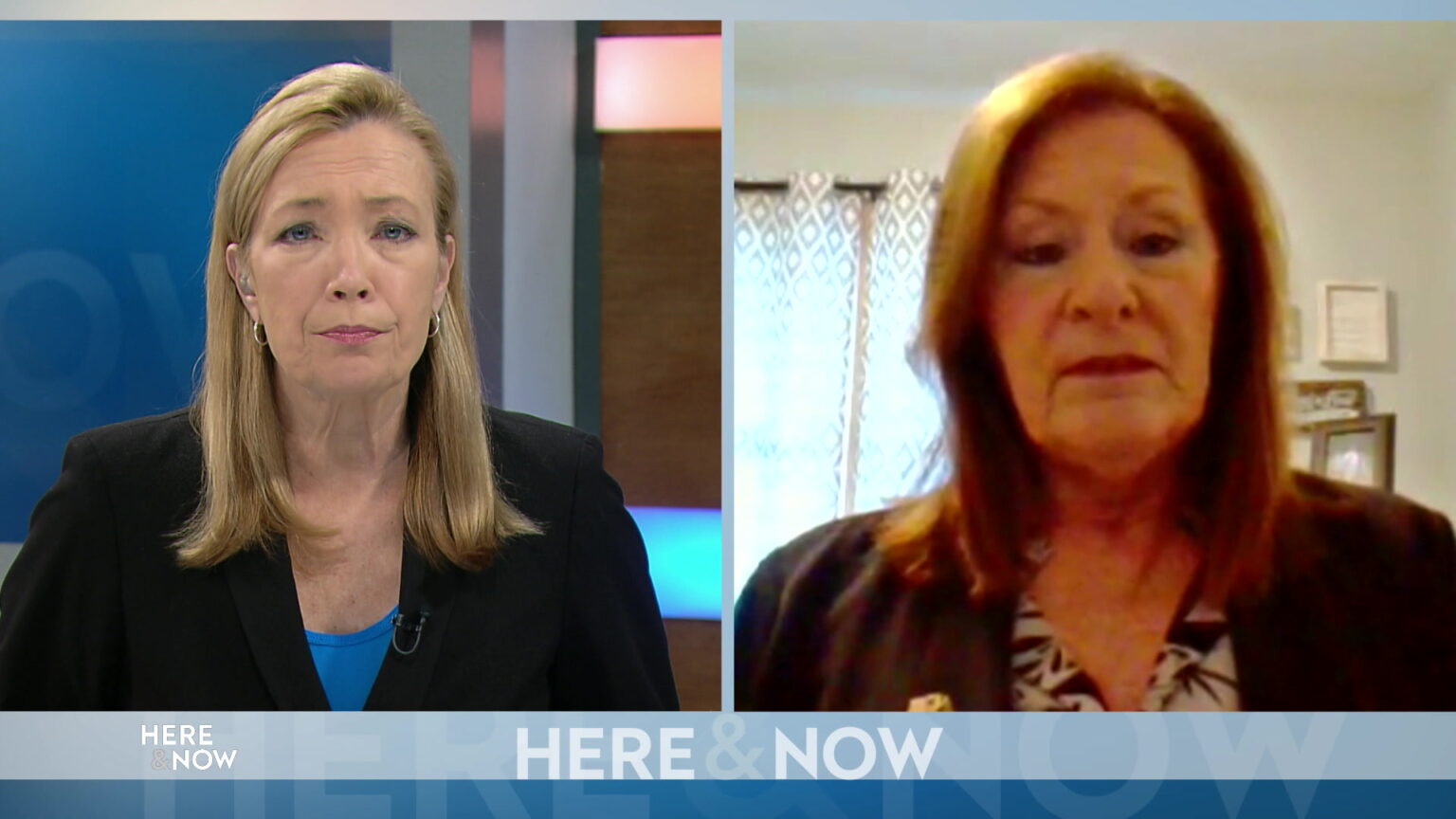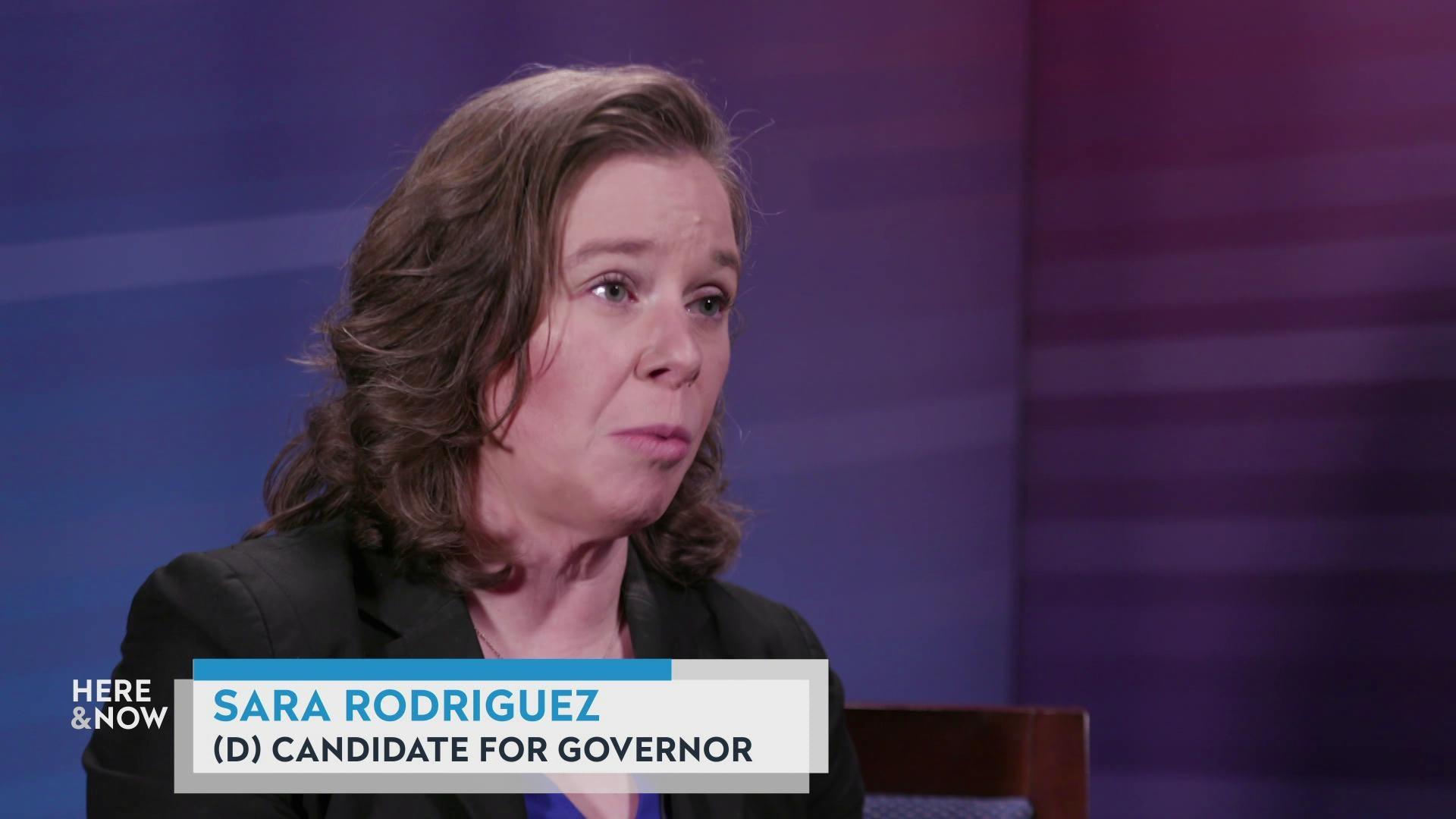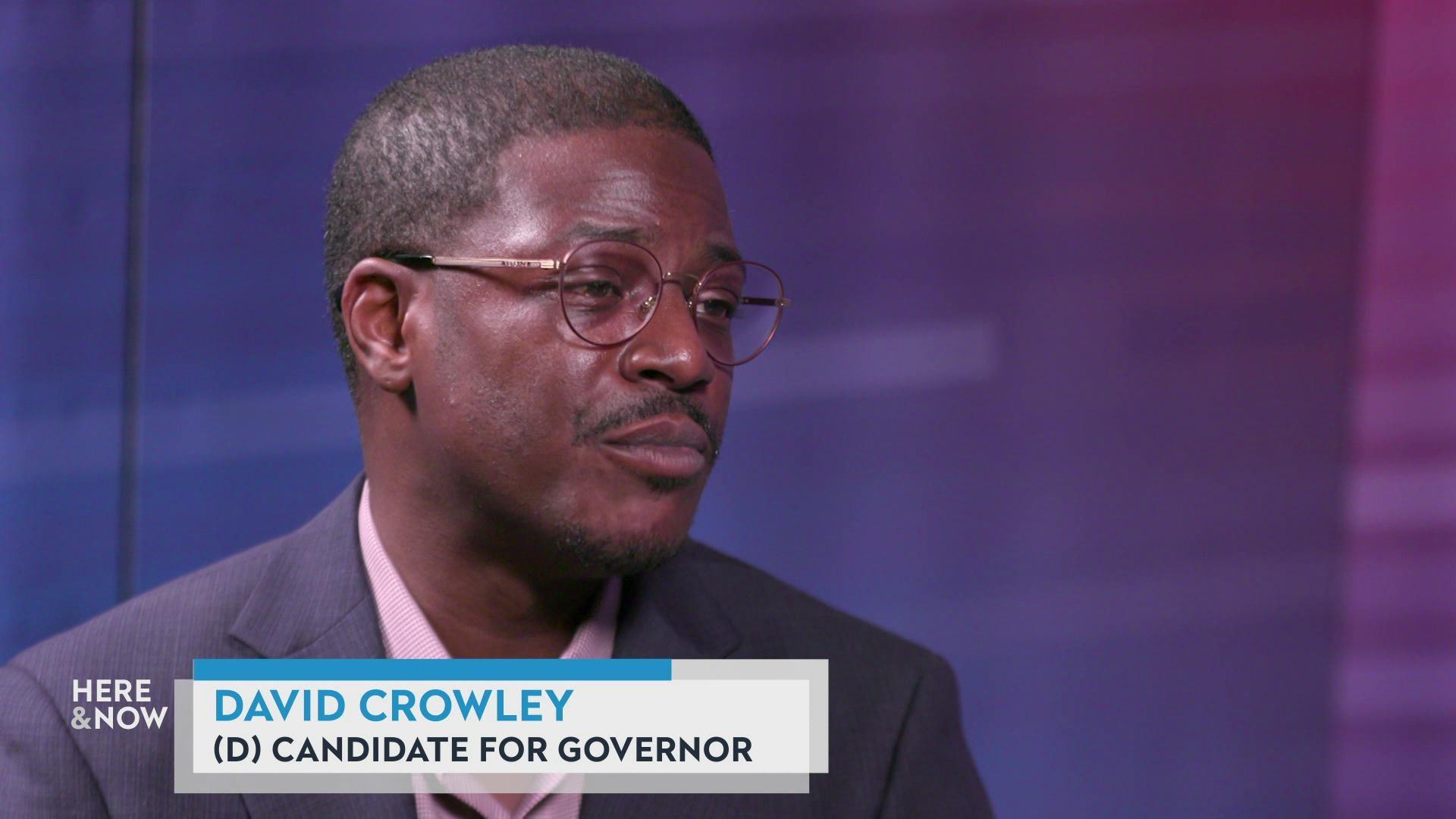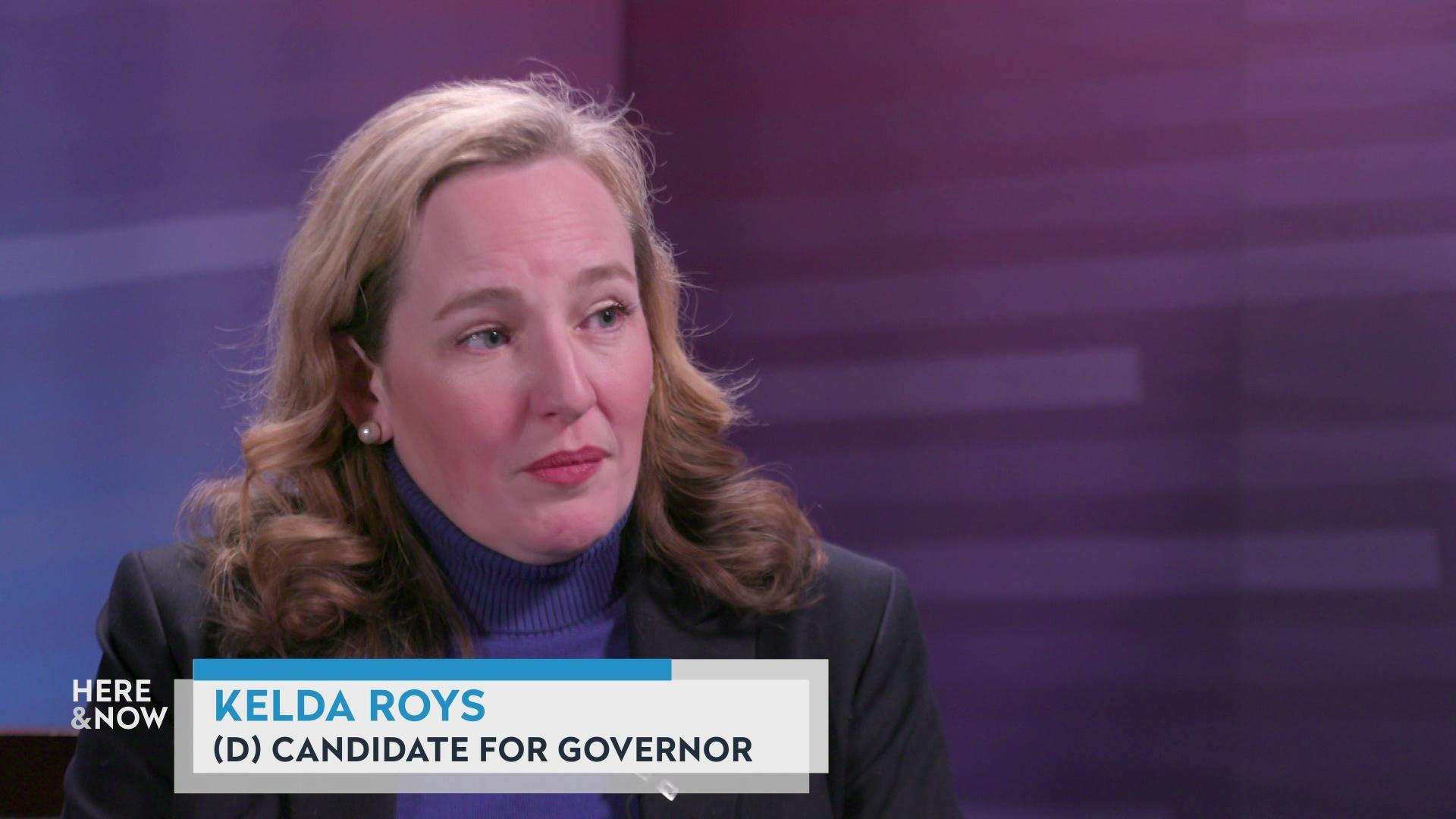'Here & Now' Highlights: Kathy Bernier, Luke Hilgemann, Lanny Glinberg, Shawn Johnson
Here's what guests on the Oct. 29, 2021 episode had to say about calls for Wisconsin's top election official to resign, Republican voting maps, the status of the state's wolf hunt and the start of the Rittenhouse trial.
By Frederica Freyberg | Here & Now
November 1, 2021

Frederica Freyberg and State Sen. Kathy Bernier, R-Chippewa Falls (Credit: PBS Wisconsin)
A “political firestorm” roiled Wisconsin in the final days of October after a local sheriff declared election fraud and accused the Wisconsin Elections Commission of breaking state law. State Senator Kathy Bernier, R-Chippewa Falls, responded to this matter and discussed a new investigation into the 2020 vote. The wolf hunt in Wisconsin scheduled to begin Nov. 6 has been put on hold by a circuit court and a federal court judge heard arguments in a separate lawsuit but did not issue an injunction. Luke Hilgemann, CEO of the advocacy group Hunter Nation, called the temporary injunction “ridiculous.” Republican voting maps got a public hearing at the state Capitol before the full Legislature votes on them in coming days. Wisconsin Public Radio’s Shawn Johnson unpacks how the important and contentious redistricting process may play out. Nov. 1 is the start of the trial of Kyle Rittenhouse, who is charged with homicide in the shooting deaths of two men in Kenosha during fiery protests after the shooting of Jacob Blake. Lanny Glinberg, director of the UW Law School Prosecution Project, offered insight into pre-trial preparations, including the judge ordering that attorneys cannot refer to the men who were shot as “victims” for fear of bias.
State Sen. Kathleen Bernier, R-Chippewa Falls
Chair, Wisconsin Senate elections committee
- Racine County Sheriff Christopher Schmaling accused the Wisconsin Elections Commission of breaking state law during pandemic voting in 2020 by allowing nursing home staff to help residents cast their ballots in place of special voting deputies. The sheriff’s office rolled out findings of its 10-month investigation alleging election fraud. The Racine County District Attorney has not filed charges, but Republican Assembly Speaker Robin Vos called on the commission’s administrator to resign. Other Republican legislators said all six commissioners should also immediately step down. Administrator Meagan Wolfe called the response a “blatantly partisan and coordinated attempt to baselessly challenge the integrity of democracy in our great state,” referring to the situation as a “political firestorm.”
- As chair of the Wisconsin Senate’s elections committee state Sen. Kathleen Bernier, R-Chippewa Falls is launching another investigation into the 2020 election following the non-partisan Legislative Audit Bureau review that made 30 recommendations for the Wisconsin Elections Commission and 18 for the state Legislature to consider related to election procedures. Here & Now asked Bernier about the Racine County Sheriff’s allegations — the senator said she does not agree with calls for Wolfe to resign.
- Bernier: “She is doing what the Elections Commission tells her to do or tells her not to do. I don’t believe it is fair to a staff person to hold her 100% accountable for what the Elections Commission has decided. … I believe the commission is set up for failure at this point with the personalities that are involved, with three Democrats and three Republicans, each voting their separate partisan wishes.”
- Bernier said the focus of the committee’s election investigation is a matter brought out by the Legislative Audit Bureau’s report — that election officials may not have accommodated the requests for auditors to physically handle election records, which some clerks deny and the Legislative Council said was “arguably reasonable” based on U.S. Dept. of Justice guidance.
- Bernier: “This investigation has to do with election officials who may not be accomodating the Legislative Audit Bureau. I don’t believe that can stand because our state law directs counties, municipalities to accommodate the audit bureau’s requests.”
Luke Hilgemann
CEO, Hunter Nation
- Wisconsin’s second wolf hunt of 2021 was scheduled to begin Nov. 6, but a Dane County judge issued a temporary restraining order to stop the harvest and ordered the state Department of Natural Resources to promulgate formal rules for the hunt. As a result, the DNR announced it was not issuing any licenses as it works on the rules and a wolf management plan. The group that sued to force the February hunt, Hunter Nation, repeatedly called the ruling “ridiculous.”
- Hilgemann: “We know thousands of hunters have picked up the phone and demanded that this ridiculous ruling be challenged. We believe it has no basis in law and hardly any basis in logic. … This ruling jeopardizes regulations that have been held in place in the state of Wisconsin for generations, and we believe that hunters have a strong constitutional right to hunt that is being infringed by this ridiculous ruling. And we’re going to be there to fight it.”
- Six Ojibwe tribal governments in Wisconsin also sued the DNR and the Natural Resources Board in U.S. District Court to stop the fall season after hunters in February blew through the harvest quota by taking 218 wolves.
- Hilgemann: “We respect and appreciate the opinions of the Native American tribes in the state of Wisconsin, but we also respect and appreciate the reality that wolves aren’t just selective killers, right? We’ve had thousands of animals and livestock that have been killed by wolves as they expand their territory in Wisconsin.”
Lanny Glinberg
Director, University of Wisconsin Law School Prosecution Project
- The judge in the Kenosha County trial of Kyle Rittenhouse, who is charged with homicide in the shooting deaths of two men and the wounding of another in the course of protests over the police shooting of Jacob Blake, catapulted the case into the headlines during a pretrial hearing. The judge ruled attorneys in the case may not refer to the men he shot as “victims,” but may refer to them as “rioters, arsonists and looters.”
- Glinberg: “I don’t want to speak for the judge, but I expect the concern goes something like this: that to identify someone as a victim is to conclude that a crime was committed and perhaps indicate who committed it.”
- If calling someone a victim biases jurors against a defendant, why doesn’t calling them rioters, arsonists or looters create bias in another direction, like they deserved to be shot and killed? Glinberg addressed that line of thought.
- Glinberg: “If the judge’s position is that we shouldn’t use the term victim, so there’s already been proof of a crime. We ask a fair question: Why would we identify someone as an arsonist unless there’s been proof that they’ve burned down a building?”
Shawn Johnson
Capitol Bureau Chief, Wisconsin Public Radio
The Republican-controlled state Legislature’s 2021 redistricting maps came before a public hearing at the state Capitol, with opponents slamming them as being rigged and supporters lauding them as following legal principles and sticking closely to the existing maps. Both sets of maps give Republicans a significant advantage in elections. Johnson and WPR’s Bridget Bowden are producers of a multi-episode podcast titled “Mapped Out,” in which they reported, “when you have a majority that you know you won’t lose, you can afford to think big.”
Johnson: “There’s stuff that Republicans have done in the past that gets locked in. So they passed Act 10, for example, or voter ID. There was never really a big attempt to undo those policies because the new Legislature was never going to overturn those things. There’s stuff that they don’t have to do. For example, medical marijuana is supported by more than 80% of the public, but there’s never been a push in Wisconsin really to allow for medical marijuana. And then you have stuff that might have been unthinkable for Republicans before — like right to work in the private sector, a right-to-work law where they said for years they didn’t want that. … So there’s all sorts of categories of stuff where Republicans can behave differently, whether it means doing something or not doing something when you have the map at your back.”
Gov. Tony Evers is expected to veto the Republican voting maps after the Legislature votes on them in coming days.
Johnson: “I think it’s pretty much a given that it’s going to court. In the past, that has gone to a federal court where a three-judge panel has decided maps. But the federal court has given indications that it’s going to give the state Supreme Court the first shot at it this time. The state Supreme Court hasn’t drawn maps in Wisconsin since 1964, so it’s not a given that they’re going to do it this time. But this is where Republicans want it resolved, and they’re asking the court to basically agree with their idea of making as few changes as possible to the maps that they passed and they like from 2011.”
Watch new episodes of Here & Now at 7:30 p.m. on Fridays.
 Passport
Passport











Follow Us